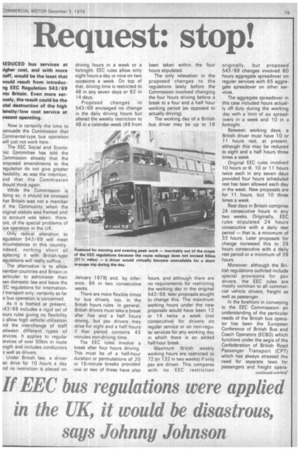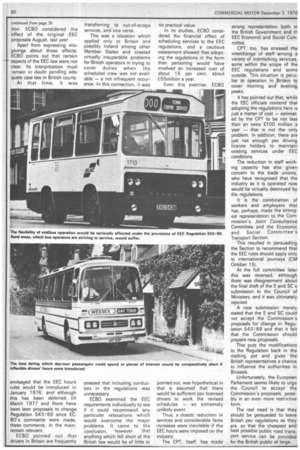Request: stop!
Page 83

Page 84

If you've noticed an error in this article please click here to report it so we can fix it.
IEDUCED bus services at tigher cost, and with more laff, would be the least that vould result from introducng EEC Regulation 543/69 nto Britain. Even more serDusly, the result could be the otal destruction of the high lensity/low cost service at present operating.
Now is certainly the time to persuade the Commission that Continental-type bus operation will just not work here.
The EEC Social and Econo-nic Committee has told the :ommission already that the Droposed amendments to the -egulation do not give greater lexibility, as was the intention, 3nd that the Commission ;hould think again.
While the Commission is loing so, it should br., stressed hat Britain was not a member )f the Community when the triginal statute was framed and lo account was taken, thereore, of the special problems of Pus operation in the UK.
Only radical alteration to egulation 543/69 will meet :ircumstances in this country ndeed, nothing short of eplacing it with British-type egulations will really suffice.
The alternative is to allow nember countries and Britain in tarticular to administer their own domestic law and leave the :EC regulations for internationil transport only, certainly as far is bus operation is concerned.
As it is framed at present, 43/69 includes a rigid set of lours rules giving no flexibility D allow high vehicle utilisation nd the interchange of staff ietween different types of ervices. It applies to regular ervices of over 50km in route .3ngth and includes conductors s well as drivers.
Under British law, a driver an drive for 10 hours a day nd no restriction is placed on driving hours in a week or a fortnight. EEC rules allow only eight hours a day or nine on two occasions a week. On top of that, driving time is restricted to 48 in any seven days or 92 in 14 days.
Proposed changes in 543/69 envisaged no change in the daily driving hours but altered the weekly restriction to 48 in a calendar week (46 from January 1979) and, by inference, 84 in two consecutive weeks.
There are more flexible times for bus drivers, too, in the British hours rules. In general, British drivers must take a break after five and a half hours driving, but psv drivers may drive for eight and a half hours if that period contains 45 minutes non-driving time.
The EEC rules involve a break after four hours driving. This must be of a half-hour duration or permutations of 20 or 1 5-minute breaks provided one or two of these have also been taken within the four hours stipulated.
The only relaxation in the proposed changes to the regulations lately before the Commission involved changing the four hours driving before a break to a four and a half hour working period (as opposed to actually driving).
The working day of a British bus driver may be up to 16 hours, and although there are no requirements for restricting the working day in the original 543/69, later proposals sought to change this. The maximum working hours under the new proposals would have been 1 2 or 14 twice a week (not consecutive) for drivers on regular service or on non-regular services for any working day in which there is an added half-hour break.
Maximum British weekly working hours are restricted to 72 (or 132 in two weeks) if only psv are driven. This compares with no EEC restriction originally, but proposed 543/69 changes involved 60 hours aggregate spreadover on regular services with 65 aggregate spreadover on other services.
The aggregate spreadover in this case included hours actually off duty during the working. day with a limit of six spreadovers in a week and 10 in a fortnight.
Between working days, a British driver must have 10 or 11 hours rest, at present, although this may be reduced to eight and a half hours three times a week.
Original EEC rules involved 10 hours or 9, 10 or 11 hours twice each in any seven days provided four hours scheduled rest has been allowed each day in the week. New proposals are for 11 hours, but 10 three times a week.
Rest days in Britain comprise 24 consecutive hours in any two weeks. Originally, EEC rules stipulated 24 hours consecutive with a daily rest period — that is, a minimum of 33 hours. Later proposals for change increased this to 29 hours consecutive with a daily rest period or a minimum of 39 hours.
Moreover, although the British regulations outlined include special provisions for psv drivers, the EEC rules are mostly common to all commercial vehicle drivers, freight as well as passenger.
In the forefront in conveying to the EEC Commisssion an understanding of the particular needs of the British bus operator has been the European Conference of British Bus and Coach Operators (ECBO) which functions under the aegis of the Confederation of British Road Passenger Transport (CPT) which has always stressed the need for separate laws for passengers and freight opera tion. ECBO considered the effect of the original EEC proposals August, last year.
Apart from expressing misgivings about those effects, ECBO points out that certain aspects of the EEC law were not clear. Its interpretation must remain in doubt pending adequate case law in British courts, At that time, it was envisaged that the EEC hours rules would be introduced in January 1976, and although this has been deferred till March 1977 and there have been later proposals to change Regulation 543/69 since ECBO's comments were made, these comments, in the main, remain relevant.
ECBO pointed out that drivers in Britain are frequently transferring to out-of-scope services, and vice versa.
This was a situation which applied only to Britain and possibly Ireland among other Member States and created virtually insuperable problems for British operators in trying to cover duties when the scheduled crew was not available — a not infrequent occurence. In this connection, it was stressed that including conductors in the regulations was unnecessary.
ECBO examined the EEC requirements individually to see if it could recommend any particular relaxations which would overcome the major problems. It came to the conclusion, however, that anything which fell short of the British law would be of little or no practical value.
In its studies, ECBO considered the financial effect of scheduling services to the EEC regulations, and a cautious assessment showed that adopting the regulations in the form then pertaining would have involved an increased cost of about 15 per cent, about E55million a year.
Even this exercise, ECBO pointed out, was hypothetical in that is assumed that there would be sufficient psv licensed drivers to work the revised schedules — an extremely unlikely event.
Thus, a drastic reduction in services and considerable fares Increases were inevitable if the EEC hours were imposed on the industry.
The CPT, itself, has made strong representation both to the British Government and th EEC Economic and Social Committee.
CPT, too, has stressed the interchange of staff among a variety of interlocking services, some within the scope of the EEC regulations and some outside. This situation is peculiar to operation in Britain to cover morning and evening peaks.
It has pointed out that, while the EEC officials contend that adopting the regulations here is just a matter of cost — estimated by the CPT to be not less than an extra £100 million a year — that is not the only problem. In addition, there are just not enough psv driving licence holders to maintain existing services under EEC conditions.
The reduction in staff working capacity has also given concern to the trade unions, who have recognised that the industry as it is operated now would be virtually destroyed by the regulations.
It is the combination of workers and employers that has, perhaps, made the strongest representation to the Commission's Joint Consultative Committee and the Economic and Social Committee's Transport Section.
This resulted in persuading the Section to recommend that the EEC rules should apply only to international journeys (CM October 15).
At the full committee later this was reversed, although there was disagreement about the final draft of the E and SC's submission to the Council of Ministers, and it was ultimately rejected.
A new submission merely stated that the E and SC could not accept the Commission's proposals for change in Regulation 543/69 and that it felt that the Commission should prepare new proposals.
This puts the modifications to the Regulation back in the melting pot and gives the British representatives a chance to influence the authorities in Brussels.
Unfortunately, the European Parliament seems likely to urge the Council to accept the Commission's proposals, possibly in an even more restrictive form.
The real need is that they should be persuaded to leave British psv regulations as they are, so that the cheapest and best possible public road transport service can be provided for the British public at large.






























































































































